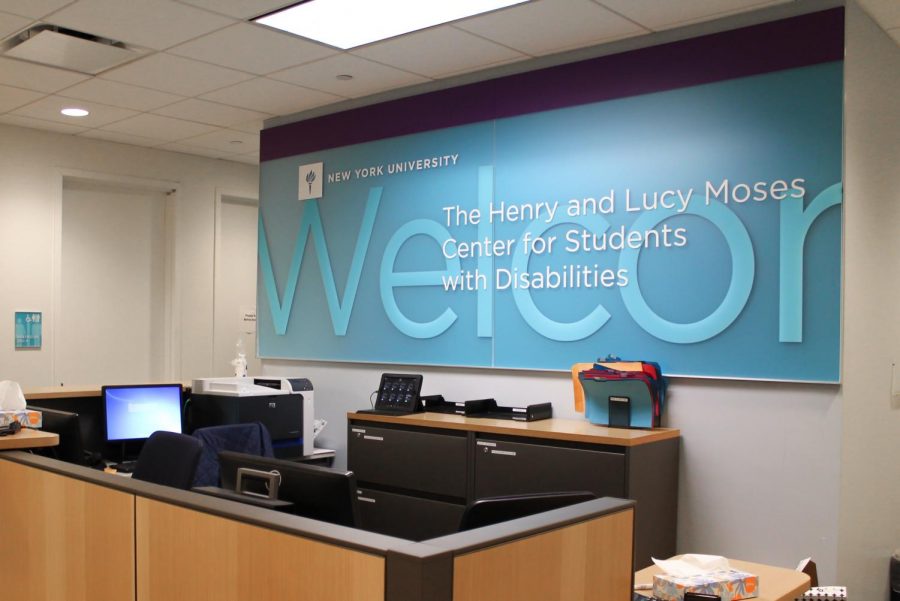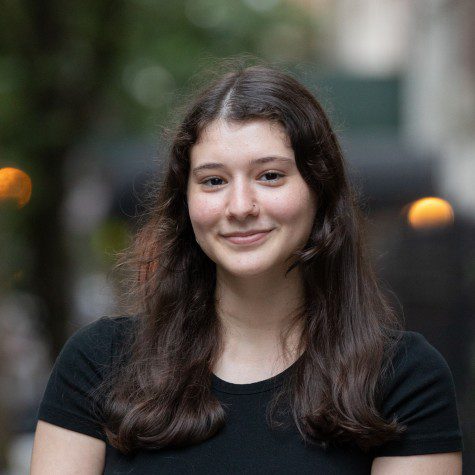As NYU returns to in-person learning, students with disabilities urge the university to continue offering remote classes
The pandemic demonstrated that NYU is capable of providing academic accommodations. Students with disabilities wonder why these accommodations are no longer available
During the pandemic, the Moses Center provided students with disabilities with helpful accommodations. Students with disabilities appreciated the option of remote learning, but are disappointed that this policy is being phased out as the school returns to in-person instruction. (Photo by Alessia Garcia)
August 25, 2021
CAS fourth-year Lucia Brinzan took three semesters of medical leave after being diagnosed with Crohn’s disease in February 2020. Now, she wants to return to NYU so that she can graduate in the spring, but remains concerned about the return to in-person classes due to her suppressed immune system — even though she is fully vaccinated.
“I am concerned about the risk of exposure to COVID-19 on transportation to campus and even on campus,” Brinzan said.
The pandemic demonstrated that NYU could offer accommodations for students, such as remote classes and recorded lectures. But some students with disabilities now feel that the university is neglecting their needs. Many who have contacted the Moses Center for Student Accessibility to request these same accommodations for the fall 2021 semester have been turned down — and others only received them after a long and difficult negotiation with the center.
On Feb. 23, NYU Provost Katherine Fleming announced that students and faculty should expect a return to fully in-person learning in the fall. Since then, the administration has sent numerous emails and updates detailing the return to in-person classes. Many of these emails emphasize the importance of health and safety, but have failed to offer guidance for students with disabilities.
“For Academic Year 2021-22, beginning with the fall semester, NYU will resume in-person teaching and learning for all courses other than those originally and specifically designed to be remote,” an NYU Returns page reads.
After fighting to stay safe from COVID-19 for the past year and a half, immunocompromised and at-risk students are upset with the university for not offering the same accommodations they did during the 2020-21 school year — especially with the rise in breakthrough cases from the delta variant. According to CDC guidance, immunocompromised people need to be cautious to protect themselves from the variant, and on Aug. 12, the FDA authorized a third vaccine dose for certain immunocompromised individuals, noting that they are “especially vulnerable to infections, including COVID-19.”
“There’s this very clear guidance from the CDC, but there’s nothing coming from NYU,” Brinzan told WSN. “I’ve even specifically asked for it multiple times and I still haven’t got anything. It makes me feel like I don’t belong here, they’re not interested in keeping me safe and that I don’t deserve to take the classes everyone else gets to take because of my health status or because of my immunocompromised state. And I think that’s completely unacceptable — at any time — but especially during a pandemic that isn’t over.”
Brinzan requested for her fall classes to have a remote option and was told by the Moses Center that it was unable to offer accommodations to her without speaking to CAS administration. She has not heard back from the Moses Center, but has been advised to change her in-person classes to online ones, which would push back her graduation date and require her to pay for classes unrelated to her career and personal interests. Currently, she is still enrolled in two in-person classes and has contacted NYU administration and the Moses Center asking for her requests to be fulfilled since she will not return to in-person classes.
“I think it’s absolutely a reasonable request,” Brinzan said. “I believe that NYU does have both the technological and planning capabilities to provide this accommodation during the pandemic to the students that need it.”
When incoming Steinhardt first-year Mariah Mendoza — who is also immunocompromised — requested to take their classes online, they were told that if they did not return to campus, they would lose their scholarship — something that they find unreasonable since the pandemic is not over and NYU has proven that they are able to accommodate blended classes.
“They told me I was gonna have to return to campus no matter what to keep my scholarship,” Mendoza told WSN. “Which was fine, but I was hoping I can do online class in my dorm, and they told me no, that they weren’t gonna offer that at all this year.”
In May, Mendoza was approved for housing accommodations, including access to a kitchen, grab bars in the bathroom and close proximity to campus. However, when housing selections were announced the second week of July, they were given the incorrect dorm placement.
After multiple exchanges with Kami Velez, the senior manager of NYU housing services, the Moses Center — where they were told their accommodations were never approved — and three dorm changes, Mendoza received placement in a dorm with accommodations, but is hurt by interactions with the senior manager that felt rude and ableist.
“If you do not accept or do not reply to this offer your eligibility for reasonable accommodations can no longer be considered,” Velez said in an email regarding Mendoza’s final dorm offer.
Since the dorm they were initially placed in did not have accommodations, Mendoza finds it unfair that reasonable accommodations would no longer be offered by the Moses Center.
“The Moses Center was kind of just like, ‘This is what we’re going to give you,’” Mendoza said. “Instead of the Moses Center giving me the resources I need, they kind of just gave me a flat rate of what they were going to help with. And then they were like, ‘everything else is on your own’, which is extremely frustrating because I shouldn’t have to [fight for accommodations and accessible learning] on my own. Especially because we saw how accommodating they were before.”
Gallatin junior Chad Evans, who has housing accommodations for chronic OCD, shares Brinzan and Mendoza’s frustration with the Moses Center from his experience in NYU quarantine during spring 2021 and his overall dorming experience. While in quarantine, he contacted the Moses Center and NYU housing to find out why he did not have accommodations. He was told by members of each office that he would have to contact the other office to receive them, leading him to believe that there is a disconnect between the Moses Center and NYU housing.
Evans noted that the Moses Center has resources and faculty to help students with disabilities, but he is not confident that they can accommodate his needs. Although he does not feel supported by the Moses Center, Evans feels supported by his professors who — for the most part — have been extremely accommodating, especially during the pandemic.
“I know professors understand accommodations,” he told WSN. “They understand disabilities, and not so much like, oh give them excuses if you need an extension or something like that, but they understand the needs of their students. I feel like it’s much easier working directly with your professors, than dealing with the bureaucracy of the Moses Center at this point.”
As a new student, Mendoza does not have experience with professors and is concerned that their lack of academic accommodations, such as a remote option for their classes, will stunt their learning since they are unsure of how accommodating their professors will be. If they have a flare — a periodic worsening of chronic illness symptoms — Mendoza will likely be unable to attend classes for days at a time, causing them to miss large portions of their education.
“I applied to NYU for the education,” Mendoza said. “The fact that they aren’t going to give me the education is really upsetting. So it does put a lot of obstacles that I’m going to have to figure out and I might not figure [them] out.”
Mendoza — who helped a graduate student get accommodations at NYU — finds it absurd that disabled students have to now figure out accommodations on their own.
“I find it really disheartening that students have to go to Reddit to figure out how they can make their college experience the most successful and the best for them,” they said. “Especially at a school like NYU that prides itself on being this progressive school.”
After his experience with the Moses Center, Evans now views the center as a formality rather than a helpful resource for students.
“The whole experience made me question if the disability accommodations are almost like about reducing liability rather than protecting the students,” Evans said. “And just about a minimal compliance with ADA rather than actually seeing the registered students get the support they need.”
Representatives for NYU and the Moses Center administration did not immediately respond to WSN’s request for comment.
Contact Rachel Fadem at [email protected].

























































































































































